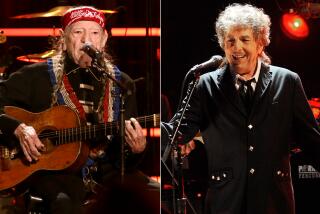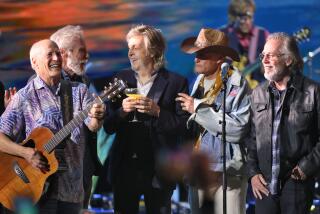JAZZ REVIEW : Fourth Annual Drew Benefit Ends on Some Bright Notes
- Share via
Under skies where patches of light blue contrasted with ominous grays, the fourth annual Jazz at Drew benefit was brought to a close Sunday by organist Jimmy Smith’s friendly screeches on a romping blues number with Gerald Wilson’s All Stars.
The two-day event, held Saturday and Sunday on a grassy area of the Charles R. Drew School of Medicine and Science in Willowbrook, spotlighted Smith, Joe Henderson, Bobby Hutcherson, Cedar Walton, the Brothers Johnson and many others.
Trumpeter Oscar Brashear and pianist Billy Childs, who followed the Fremont High School Pathfinder Jazz Ensemble and the B Sharp Jazz Quartet, offered a succulent set Sunday that included Walton’s gorgeous “Clockwise” and an ardent prance through Monk’s “I Mean You.” There, Brashear unleashed buzzy then bright tones, his notes flowing. Then Childs played runs that glistened and jagged chords as hard as rocks.
Hutcherson played with Walton’s trio, which sported drummer Billy Higgins, whose emphatic accents moved the music in marvelous ways. The band played Walton’s alluring “Bolivia,” where the pianist was economical and elegant, and a medium blues, which Hutcherson tore up with dynamic ideas. Henderson joined the foursome and was, as usual, sparklingly inventive.
Wilson’s crew played four numbers, among them “You Better Believe It!,” with fat-noted solos from Snooky Young (trumpet) and George Bohanon (trombone), and “Milestones,” where altoist Buddy Collette was spry and most modern and tenorist Herman Riley offered dancing, robust ideas. Singers Carmen Bradford and Ernie Andrews each performed with verve and power.
Roland Betts, Jazz at Drew’s executive producer, called the two-day festival a success, and estimated the crowds at 2,500 for Saturday and 2,000 on Sunday, about twice the size of last year’s attendance.
The only drawback to the show was the sound system, which sometimes buzzed, and other times muffled some instruments so that they could hardly be heard.
More to Read
The biggest entertainment stories
Get our big stories about Hollywood, film, television, music, arts, culture and more right in your inbox as soon as they publish.
You may occasionally receive promotional content from the Los Angeles Times.








